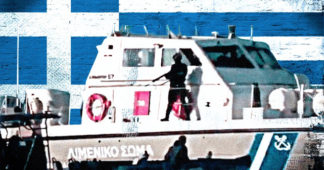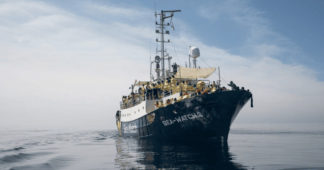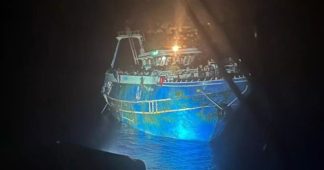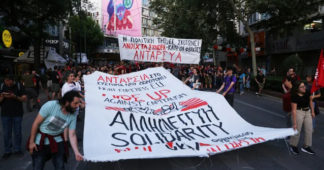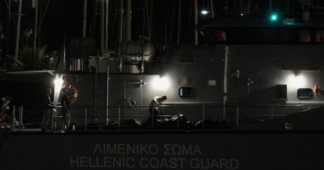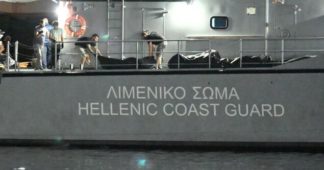BBC film tells the story of the Adriana disaster, where hundreds drowned, alongside that of Greek authorities allegedly abducting refugees and abandoning them at sea
By Oscar Rickett
24 July 2024
High up on a cliff overlooking a bay on the Greek island of Lesbos, Fayad Mulla is waiting to witness a crime.
With the Austrian journalist’s cameras running, a white van arrives on the road by the shoreline. The back doors open and 12 people – who were locked inside – are brought out.
They are taken by masked men onto a speedboat. We see a baby being carried by one of these men and passed up onto the boat, which then heads out to a larger vessel waiting on the edge of the bay. This vessel belongs to the Greek coastguard. It heads out into the middle of the Aegean Sea, where the people taken from the van are thrown overboard onto flimsy life rafts.
Appearing just over half an hour into the BBC’s recently released documentary feature, Dead Calm: Killing in the Med?, this footage is the most striking in a string of sickening shocks administered by this excellent film.
Director Ben Steele’s documentary tells two different but connected stories. The first is that of the Adriana, a dangerously overcrowded fishing trawler that capsized off the coast of Greece’s Peloponnese peninsula on 14 June 2023, killing more than 500 people in one of the deadliest refugee boat disaster in years.
The second concerns the alleged use of kidnapping and violence by the Greek coastguard and Greek special forces to stop people from outside Europe arriving on the continent.
This includes, as is shown in Mulla’s footage, in footage from the Turkish coastguard and in witness testimony, the abduction of refugees who have already landed on Greek islands and who are then dumped outside Greek waters on life rafts, where they have little chance of survival.
One of the film’s concluding pieces of analysis is that between 2020 and 2023, the Greek coastguard caused the deaths of 43 people who were forced out of Greek territorial waters or taken out to sea after reaching Greek islands. Nine of these people were deliberately thrown into the water.
Together, these stories show clearly where Europe now stands on migration, with politicians from across the continent implicated in a programme of brutality that seeks to stop people at any cost from reaching the safer shores they believe are waiting for them.
The Mediterranean is now the world’s deadliest migration route, but those who take to its waters will continue to do so as long as the vast forces driving them – war, political instability and repression, severe economic inequality, climate breakdown – remain unchecked.
Fleeing war and waste
At the heart of Dead Calm’s retelling of the Adriana disaster are two young men fleeing Syria’s civil war. Mohammed and Abdelrahman were on the boat when it departed Tobruk, a port on Libya’s eastern Mediterranean coast, on the morning of 9 June.
Having been told it would be a “VIP experience”, they arrived to find something far worse, with men holding sticks and electrical cables present to ensure passengers didn’t act on their second thoughts about embarking.
The gang running the operation, which an investigation in Der Spiegel has connected to the family of eastern Libyan commander Khalifa Haftar, had thrown supplies overboard in order to cram approximately 750 people onto the boat.
At the bottom of the Adriana were mostly people from Pakistan. In the middle, women and children. At the top deck, Palestinians, Syrians and Egyptians.
Collectively, they paid as much as £3m ($3.5) to be smuggled to Italy, according to New York Times journalist Matina Stevis-Gridneff, who is an informed voice throughout the film and who adds that for an extra $50 or so, passengers could get a spot on the deck.
The voyage quickly begins to go wrong. The Adriana gets lost. They run out of drinking water and passengers have to consider drinking engine cooling fluid.
Three adults and a child die as the vessel reaches the Greek search and rescue zone on the fifth day. It is only then that a distress call is made to the outside world.
But while Frontex, the European Union’s border agency, sends out a drone to survey the situation, nothing that would actually help the passengers is done and as the Greek authorities get involved, the situation becomes even more dangerous.
While Mohammed and Abdelrahman fear for their lives and look after their fellow passengers, Dead Calm investigates, partly through the work of Stevis-Gridneff, Mulla and Dutch journalist Romy van Baarsen, cases in which migrants and refugees are abducted from Greek islands and dumped out in international waters.
Ibrahim, from Cameroon, describes being abducted by masked men, beaten, strip-searched and then taken out to sea where he and a number of others were thrown overboard into the water. He talks about an Ivorian who pleads, “Save me, I don’t want to die”, before the water engulfs him. An “incredible strength” animates Ibrahim, and he survives, swimming to shore and vowing to “testify for the oppressed”.
A Greek special forces operative found by van Baarsen on a dating site tells her that orders to round up migrants who arrive in Greece on boats come “from the minister”. In one breathtaking scene, Dimitris Baltakos, the former head of special operations with the Greek coastguard, gives up more information than he intends.
Shown Mulla’s footage of people being taken out of a van and out to sea, he refuses in his interview to speculate about what has happened or who is responsible.
He says that mothers who take to the Mediterranean “often abandon their children. They don’t seem to have the same affection that we have for children”.
But then, during a break, he is recorded talking to someone out of shot in Greek: “I haven’t told them much, right? It’s very clear, isn’t it. It’s not nuclear physics.
“I don’t know why they did it in broad daylight… It’s… obviously illegal. It’s an international crime.”
Europe and its brutal border
No serving Greek official sat down with the BBC and the Greek authorities told the film-makers that it was not policy for refugees to be removed from Greek territory.
Kyriakos Mitsotakis, the conservative prime minister of Greece, is a presence through the film, boasting of reducing migration by 90 percent, claiming the coastguard has saved “tens of thousands” and reminding us that Greece is “protecting not just the Greek borders but the borders of Europe”.
And while it is easy to blame the old, seafaring nation of Greece for abandoning its ancient code of xenia (hospitality), this is really a story about Europe and the way in which vicious opposition to outsiders and panic about overcrowding has come to define not only its border policy but also the domestic politics of many of its states.
In the end, the captain of a luxury superyacht owned by a Mexican billionaire steps in to rescue the few survivors of the Adriana, which capsizes after a Greek patrol ship tries to tow it out of Greek waters (something authorities deny).
The sight of stricken refugees getting off this potent symbol of wealth is almost too on the nose.
Charged with being the human face of European border policy, Jonas Grimheden, head of fundamental rights at Frontex, does his best to maintain his Scandinavian cool, remaining firm but concerned throughout his interview with the film-makers until towards the end, when the mask slips and there, in Frontex’s vast Warsaw HQ, the disparity between EU statements about how no one “should die at sea trying to reach Europe” and the reality of exactly that happening can no longer be ignored.
As Dead Calm’s interlocking stories wound to their devastating ends, I thought of Daryan, an Iraqi Kurdish refugee I interviewed on the south coast of England, where he was being held in a detention centre.
Along with three other Kurdish asylum seekers, we walked down from Folkestone’s Napier Barracks, built in the Napoleonic era, to the beach. It was a beautiful day and the four young men were feeling optimistic, despite their circumstances.
Daryan recalled crossing the English Channel, which he described as being difficult but bearable, particularly when he saw the white cliffs of Dover and knew he was going to make it. Then he described the seven days he spent on the Mediterranean.
He talked about the people he knew who had drowned trying to reach Europe, about the smell of vomit and the cries of distress. “I will never forget it,” he said.
We remind our readers that publication of articles on our site does not mean that we agree with what is written. Our policy is to publish anything which we consider of interest, so as to assist our readers in forming their opinions. Sometimes we even publish articles with which we totally disagree, since we believe it is important for our readers to be informed on as wide a spectrum of views as possible.

